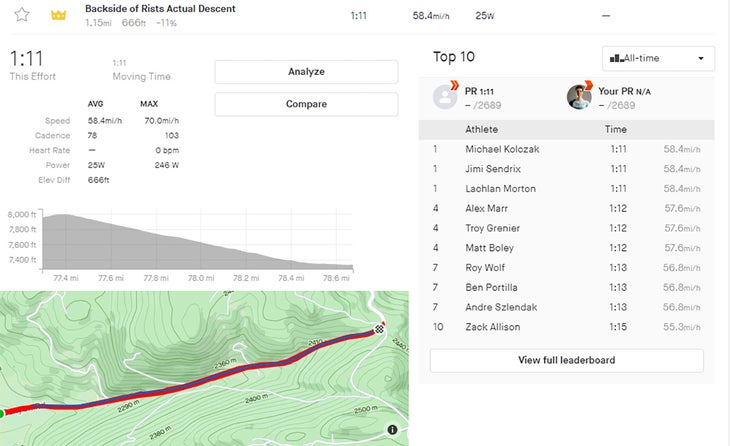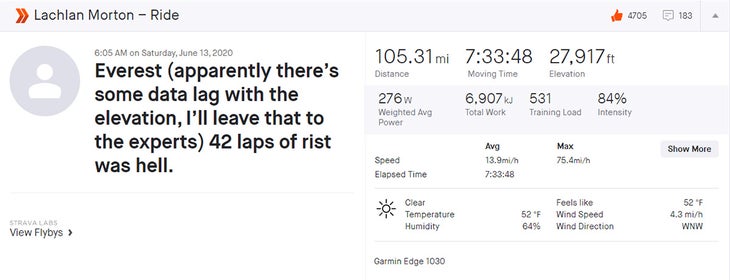The world Everesting record has been falling faster than cyclists in a wet roundabout. In just the last few weeks, the record has gone from the palmarès of ex-pro Phil Gaimon to mountain biker Keegan Swenson, and then unofficially Emmanuel Buchman (Bora-Hansgrohe) who broke the ‘official’ rules by riding more than one climb. It was once thought that completing an Everesting – climbing the height of Mount Everest (8,848m, or 29,029 feet) in one ride using repeats of just a single climb – in under eight hours was impossible. Only a handful of riders in the world had the fitness required to achieve such a feat, and they were too busy racing to sacrifice valuable training time anyway.
But in 2020, that all changed. With little else to do other than ride indoors or solo on the road, Everesting became the challenge of choice for many. And this past week, we saw Lachlan Morton (EF Pro Cycling) lower the official Everesting benchmark to 7 hours 32 minutes and 54 seconds. Known for his off-road adventures and frequent FKT attempts, it seemed as though 42 repeats up Rist Canyon in Colorado might be no problem. Almost on a whim, after doing five and six hours of training the two days before, Morton went for the Everesting record with his dad handing up bottles for support. Less than a work-day later, Lachlan Morton had completed the fastest Everesting in history.
We dove into the numbers behind Morton’s world record ride:
***
Lachlan Morton (EF Pro Cycling)
Height: 1.8 m (5 ft 11 in)
Weight: 63 kg (139 lbs.)
Age: 28
***
Just after six in the morning, Morton began Lap 1 of 42, climbing 1.93 kilometers up the backside of Rist Canyon which averages 11 percent, a climb that he chose for its steepness and straightness. The steeper the climb, the faster you gain elevation, and the faster you descend – ideal for record-breaking, but also really freaking hard. The lack of corners meant that neither brains nor brakes were required until the U-turn at the bottom of the descent, allowing with maximum physical and mental recovery, in short, 1-minute bursts.
Compared to other sub-eight hour Everestings, Morton’s climb was short – similar to Gaimon who chose a climb 1.3 km long at an average of 11 percent. Swenson’s section of Pine Canyon in Utah climbed for 3 km at an average of 10.6 percent, while Buchman’s outlier choice was the 9.4 km long Heimelerberg in Austria which averages 11 percent. A shorter climb meant a shorter descent, and Morton was granted only about a minute and 10 seconds of rest after each climb up Rist Canyon.
Attempting an Everesting at altitude is interesting, and I have yet to find any concrete evidence of this being faster or slower than at sea-level. Even for the acclimated, there are a number of potential trade-offs to Everesting at altitude: impaired physical performance, faster-moving speed, heat and humidity, etc. Which way the balance ultimately swings I am not 100 percent sure.
With Rist Canyon climbing from 2,255m to 2,468m, Morton’s choice was clear, and just after 6 AM on a cool Colorado morning, he set off.
Morton made his fastest ascent on Lap 1, finishing the climb in well under nine minutes and screaming back down to the bottom at over 106 kph (66 mph).

Lap 1: 8:38
Average Power: 309w (4.9w/kg)
Average Speed: 13.4 kph (8.3 mph)
Morton’s pace remained strong and steady for the first few hours, completing each climb in between 8 minutes 41 seconds, and 8 minutes 59 seconds. The first time he crossed into the nine-minute range was Lap 20, nearly three and a half hours into the ride.
Lap 20: 9:02
Average Power: 289w (4.6w/kg)
Average Speed: 12.9 kph (8 mph)
Morton’s pace slowed ever so slightly in the second half, averaging ~9:10 per climb from Lap 21 through 35. Despite this, the Australian was still holding good power, about 280w (4.5w/kg) at this pace. As he closed in on the final hour of Everesting, he even took the Strava KOM on the descent, a harrowing 100+ kph journey following every lap.

Descent KOM: 1:11
Average Power: 25w
Average Speed: 94 kph (58.4 mph)
Max Speed: 113 kph (70 mph)
The “last two and a half [hours] really dragged,” Morton told EF Pro Cycling, as his ascent times nudged into the 9:20s. His slowest repeat came on Lap 36 in a time of 9:27. But in the grand scheme of things, Morton’s pacing and consistency were mightily impressive, which is unsurprising coming from a rider who seems to ride from dusk past dawn at least once a month.
Lap 36: 9:27
Average Power: 270w (4.3w/kg)
Average Speed: 12.2 kph (7.6 mph)
Average Cadence: 60 rpm
Morton finished the last five reps in 9:20, 9:22, 9:24, 9:21, and 9:17, respectively, without much of a word or celebration atop the final climb to honor his world record achievement. Afterward, Morton said, “I know someone will go faster, that’s the point. Put a mark out there, have someone think… ‘Yeah maybe I can do that.’ It’s a progression; anyone can have a crack at it.”
So, who’s next?
***

Full ride
Distance: 169.5 km (105.3 mi)
Time: 7:33:48
Elevation Gain: 8,509m (27,917 ft.)
Average Power: 254 W (4.0w/kg)
Weighted Average Power: 276 W (4.4w/kg)
Work: 6,907 kJ
(Strava: https://www.strava.com/activities/3609835756)
Official Everesting Stats
Time: 7:32:54
Elevation Gain: 8,848 m (29,029 ft.)
Route: 42x Backside of Rist Canyon
Climb: 1.93 km at 11 percent
